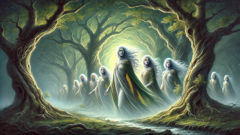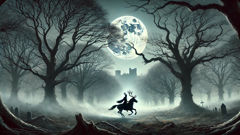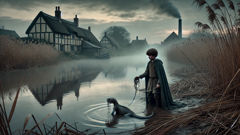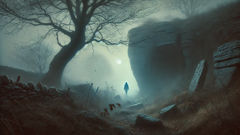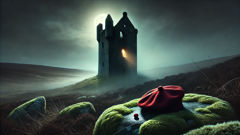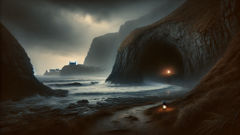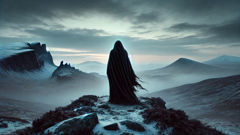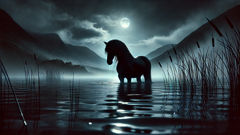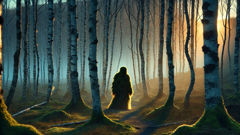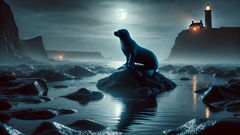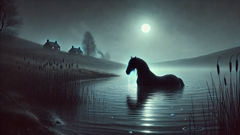Introduction
Bien avant que des cercles de pierre et les ruines de châteaux ne parsèment les champs émeraude d’Irlande, avant que les moines latins ne couchent les légendes sur des parchemins enluminés, la terre appartenait aux Tuatha Dé Danann—la Tribu de la Déesse Danu. Leur présence hantait chaque vallée verdoyante et chaque montagne voilée de nuages, dans le tumulte des rivières comme dans le silence sacré des bois anciens. Ils n’étaient pas de simples dieux vénérés à distance, mais des parents du paysage, des esprits dont les histoires étaient tissées dans les collines et les creux, gardiens d’un monde à la fois sauvage et merveilleux. Le cœur préchrétien de l’Irlande battait au même rythme que le leur : un peuple auréolé d’étoiles, maître de la magie et des arts, aussi farouche que doux, à l’image des saisons. Les Tuatha Dé Danann ne vinrent pas en conquérants, mais en porteurs de savoir et de beauté. Leur héritage a façonné non seulement les vieilles pierres, mais l’âme même de l’Irlande. Les légendes content leurs combats contre des êtres monstrueux et des envahisseurs mortels, leur musique, leurs enchantements, leurs peines et leurs espoirs. Emboîtez-leur le pas dans cette histoire—à travers brumes et landes, des eaux du Lough Corrib jusqu’aux pentes de Slieve na nÓg. Leur épopée, c’est celle de l’Irlande, un mythe vivant porté par le vent, résonnant dans le rire des ruisseaux et le murmure des feuillages.
Enfants de Danu : Naissance dans les Brumes
Au temps où l’Irlande n’était encore qu’un songe, quand la terre était jeune et couverte de rosée, les Tuatha Dé Danann mirent pied sur ses rivages. Certains racontent qu’ils arrivèrent à bord de navires naviguant dans le ciel, leurs voiles éclatantes comme l’aurore, glissant à travers les nuages pour atterrir sur les collines sacrées du Connacht. D’autres murmurent qu’ils jaillirent de la terre même, appelés par la déesse Danu, qui mêla son esprit aux rivières et à la pluie, aux lacs et à la pierre. Leur venue ne fut pas marquée par la foudre ou la conquête, mais par un silence—aussi respectueux qu’intense—qui enveloppa monts et vallées, comme si la terre elle-même retenait son souffle.
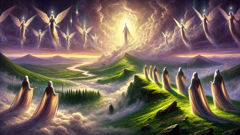
Ils étaient différents de tous les êtres venus auparavant. Les Tuatha Dé Danann, grands et élancés, semblaient intemporels mais débordants de vitalité. Leurs yeux reflétaient le bleu profond des lacs ou brillaient d’or au coucher du soleil. Ils parlaient en musique et se mouvaient avec la grâce des cygnes en vol. Ils portaient des trésors de puissance : l’Épée de Nuada, étincelante de feu d’argent ; la Lance infaillible de Lugh ; le Chaudron du Dagda, inépuisable ; et la Pierre de Fal, qui criait sous le pas du vrai roi. Plus que de simples armes ou merveilles, ces objets étaient des symboles, chacun liant les Tuatha au cœur même de l’Irlande.
Leur chef, Nuada à la Main d’Argent, était sage et juste. Il portait une main d’argent pur, façonnée par le druide-guérisseur Dian Cécht après avoir perdu la sienne au combat. À ses côtés se tenaient les enfants de Danu : Lugh aux Multiples Talents, rayonnant comme un été ; le Dagda, père bienveillant et pourvoyeur d’abondance ; Brigid, déesse de la poésie et de la flamme ; l’aimable Aengus Óg, dont les charmes savaient toucher tous les cœurs. Morrigan, l’énigmatique déesse de la guerre, passait parmi eux telle un corbeau en vol, présence à la fois promesse et avertissement.
La terre les accueillit, reconnaissant une ancienne parenté. Sous leurs soins, les champs verdoyèrent, les rivières s’éclaircirent, et les lieux sauvages prospérèrent. Les Tuatha Dé Danann ne bâtirent pas de grandes cités, préférant les salles secrètes sous les collines ou les palais masqués par la brume. Leur musique flottait sur les vallées, envoûtant les mortels égarés, et leur sagesse posa les premières lois et arts de l’Irlande. Pourtant, tout n’était pas paisible. Tandis que leur règne apportait prospérité et harmonie, une ombre montait au-delà de la mer occidentale—une marée noire prête à défier leur force et leur âme.
Alors commencèrent les rumeurs sur les Fomoriens. Ces êtres anciens et monstrueux—faits de mer et de tempête—surgissaient de l’Atlantique indompté, avides de domination. Guidés par Balor au Mauvais Œil, ils semaient terreur et chaos sur leur passage. Les Fomoriens exigeaient tribut, répandant la peur chez les peuples. Mais les Tuatha Dé Danann tinrent bon. Unis par l’amour de Danu et leur fierté, ils refusèrent de céder à l’obscurité. Leur magie et leur courage s’enflammèrent, annonçant l’affrontement qui graverait à jamais la destinée de l’Irlande.
La Première Bataille : Ombres Fomoriennes et la Main d’Argent
La paix instaurée par l’arrivée des Tuatha Dé Danann fut de courte durée. Les Fomoriens—êtres de chaos et de brume marine, immenses et difformes—déferlèrent depuis l’océan de l’ouest, apportant avec eux un vent sombre et une soif de pouvoir. À leur tête, Balor, dont l’unique œil faisait flétrir les récoltes et anéantir des armées d’un simple regard. Son regard était une malédiction et son cœur uniquement porté vers la conquête.
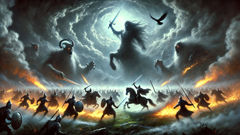
Les Fomoriens exigeaient tribut de tous les habitants de la terre : nourriture, bétail, voire des enfants. Leur règne était cruel, leurs rires résonnaient sur les falaises battues par les vents et les côtes fouettées par les tempêtes. Mais les Tuatha Dé Danann refusèrent de céder. Sous la houlette du roi Nuada, ils rassemblèrent leurs guerriers et artisans, guérisseurs et poètes. Ils invoquèrent tous les dons offerts par Danu : magie, habileté et sagesse insurpassées.
Sur la plaine de Mag Tuired, où la brume serpentait et où l’herbe était trempée de rosée, les deux peuples se rencontrèrent. La terre elle-même semblait trembler lors des affrontements. L’épée de Nuada fendait l’obscurité, la lance de Lugh atteignait toujours sa cible. Le chaudron du Dagda insufflait force à ses alliés, tandis que Brigid soignait les blessés de ses bénédictions. Morrigan planait au-dessus du champ de bataille, corbeau annonciateur du destin.
Mais le malheur frappa : Nuada perdit sa main. Selon la coutume, nul roi mutilé ne pouvait régner. Les Tuatha Dé Danann pleurèrent, mais ne faiblirent pas. Dian Cécht, le guérisseur suprême, façonna une main d’argent vif pour Nuada, aussi solide et agile que la chair. Ainsi, Nuada fut restauré—dans son corps comme dans son esprit. Il conduisit à nouveau son peuple avec espoir, bâtissant des alliances et inspirant le courage.
La première bataille fut longue, amère, mais finalement, les Tuatha Dé Danann l’emportèrent. Les Fomoriens furent repoussés vers leurs îles battues par la tempête. La paix revint, pour un temps. Pourtant, chacun savait que les ténèbres rôdaient toujours : la vengeance de Balor couvait à l’horizon, et le cycle du conflit n’était pas brisé. Dans le calme retrouvé, les Tuatha Dé Danann rebâtirent leurs palais dissimulés et pansèrent les blessures de la terre et des cœurs. Ils enseignèrent aux mortels les secrets de l’agriculture, de la poésie, de la guérison et du chant, tissant ainsi leurs dons dans la trame même de l’Irlande.
Lugh au Long Bras : Triomphe de l’été et Sacrifice
Les générations passèrent chez les Tuatha Dé Danann, et un nouveau champion s’éleva—Lugh Lámhfhada, Lugh au Long Bras. Petit-fils de Balor mais élevé parmi les enfants de Danu, il portait en lui la lumière et l’ombre. Lugh était célèbre pour ses innombrables talents : maître dans tous les arts, expert en poésie, musique, combat et sagesse. Sa présence apportait la fortune ; sa bravoure, l’espérance.
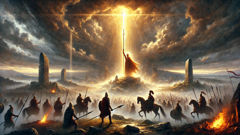
Quand la rumeur s’éleva que les Fomoriens préparaient une dernière offensive, ce fut Lugh qui se dressa devant le conseil rassemblé. Sa voix résonna claire comme un carillon : « L’Irlande ne tombera pas dans les ténèbres tant que nous respirons. » Il appela à ses côtés chaque guerrier, druide et barde. Sous sa direction, les esprits s’enflammèrent à nouveau.
La Seconde Bataille de Mag Tuired se profilait—plus vaste, plus farouche que la première. Les Fomoriens marchaient derrière Balor, son œil flamboyant brandi tel une menace apocalyptique. Mais Lugh portait la lance qui ne manquait jamais sa cible, une arme éclatante comme le soleil. Sa présence soulevait même les plus hésitants. Le Dagda maniait sa massue mythique et Brigid tissait ses bénédictions dans le souffle du vent. Morrigan évoluait au cœur du combat, tour à tour loup dans l’ombre et femme enveloppée de lumière sanglante.
La bataille fit rage plusieurs jours, le tonnerre roulant entre les collines. À l’apogée du combat, l’œil de Balor foudroya la plaine d’un souffle infernal. Mais Lugh, vif et rusé, invoqua son héritage : d’un jet puissant, il lança sa lance dans l’œil de Balor, anéantissant la terreur et brisant les armées fomoriennes.
Le prix fut lourd. Beaucoup de Tuatha Dé Danann tombèrent et la terre-même porta les cicatrices de la guerre. Lugh les pleura tous, conscient que la victoire avait le goût du deuil. Pourtant, du sacrifice naquit une force nouvelle. Les Irlandais honorèrent les disparus par des jeux, de la musique, des récits qui résonneraient à travers les siècles. La fête de Lugh—Lughnasadh—célébra la moisson, un temps de gratitude et d’espérance.
Les Tuatha Dé Danann étaient désormais de véritables souverains, mais ils gouvernaient non en tyrans, mais en gardiens responsables d’une terre vivante. Ils chérissaient chaque arbre, chaque rivière, chaque créature sous le ciel. Grâce à leur sagesse, l’Irlande s’épanouissait—les champs prospéraient, les poètes s’élevaient, la paix régnait. Mais même la victoire ne peut stopper le lent passage du destin.
Conclusion
Avec la défaite des Fomoriens et l’Irlande florissante sous leur protection, les Tuatha Dé Danann atteignirent l’apogée de leur gloire. Pourtant, le changement déferla sur la terre, aussi inévitable que la brume sur la tourbière. Les mortels—les Milesiens—arrivèrent d’au-delà des mers, porteurs de nouvelles coutumes, de nouveaux rêves, de nouveaux destins. Les Tuatha Dé Danann ne les affrontèrent ni avec colère ni regret, mais avec une solennelle acceptation. Ils comprenaient que toute ère cède la place à la suivante, tout comme l’été s’incline devant l’automne. Dans un ultime geste de grâce, ils se retirèrent du monde des hommes. Certains racontent qu’ils disparurent dans la terre elle-même, devenant les Aos Sí—le Petit Peuple—habitants des collines creuses et des tertres antiques. D’autres croient que leurs esprits vivent encore dans chaque source sacrée, chaque fort circulaire. Leur héritage perdure : dans la splendeur sauvage du paysage irlandais, dans la poésie chantée au coin du feu, dans ce sentiment discret que la magie sommeille juste sous la surface des choses. Les Tuatha Dé Danann enseignèrent à l’Irlande la valeur de la sagesse, le respect de la nature et la croyance en l’émerveillement. Leur mythe n’est pas seulement un récit ancien mais une vérité vivante, murmurée par les rivières et gravée dans la pierre, prête à toucher chaque cœur ouvert à l’enchantement du monde.

